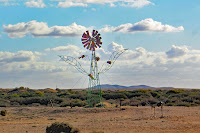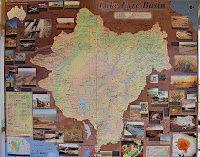Maree to William Creek.
3 Jun: Maree is a small town in northern SA where the Birdsville and Oodnadatta tracks meet.
 |
| First Bridge |
After refuelling the vehicle and purchasing grocery items, including wine, we started along the Oodnadatta Track (OT) west towards William Creek. Due to our late departure we only travelled some 40km before deciding to stop for night next to a ruined bridge on the Old Ghan railway.
 |
| Camp Site |
We found some very fascinating Points of Interest (POI) along the track, stopping to explore some of the old ruins along the Old Ghan railway line. Near Alberie Creek there was a rather unusual park, the Mutonia Sculpture Park - Plane Henge. all sculptures were constructed from scrap metal and old farm machinery.
 |
| Sculpture |
 |
| Windmill Bird |
 |
| Written on sculpture |
One of the first ruins we explored was the Curdimurka Railway Siding. Built in 1888 it is the last remaining station yard of significance left intact. A bi-annual ball used to be held here, commencing in 1986 it continued up until 1996 and was attended by several thousand people from all over Australia and from overseas.
 |
| Curdimurka Siding Water Tank |

 |
| Curdimurka Siding Front View |
On our way to our second overnight stop on 'the track', Beresford Ruins, another railway siding, we stopped at the Lake Eyre Lookout. Unfortunately there was no water visible but at least we were able to appreciate the vastness of the lake and how large the catchment area was.
 |
| Lake Eyre Catchment |
 |
Lake Eyre South Lookout
|
We were the only people camped at Beresford Ruins although several drove in but decided not to stay. This was an amazing spot with a full dam, plenty of space and lots of birdlife. Yes there are no facilities so you need to be self sufficient.
 |
| Beresford Ruins |
 |
| Birds on the Dam |
 |
| Campsite |
An unusual occurrence along this track are 'mound springs'. These are natural outlets for the waters of the Great Artesian Basin (GAB) where artesian pressure forces the water to the surface. The precipitation of salt and minerals, along with the erosion of sand and clay of the surrounding country, has created these mounds. We saw several of these mounds when we stopped to explore a place called "Strangways".
 |
| Mound Spring |
This was a wonderful opportunity for us to discover a little more history about the life and times of exploration in this area, plus the Flora.
 |
| Flora |
'Strangways' was named by explorer Warburton in 1858, named after a SA political figure of the day - Henry Bull Templar Strangways. In 1863 this property was a sheep and cattle station. The number of livestock was increased however in 1865 half the stock had perished during drought. In 1870 Strangways was selected as a repeater station for the overland telegraph and pastoralist activities ceased.
As the Premier, Strangways initiated construction of the Overland Telegraph from Port Augusta to Darwin. The telegraph repeater station at Strangways was one of 11 stations. It operated from 1872 to 1896 relaying telegraphic signals from Adelaide to Darwin. It is located on the great Anna Creek Pastoral lease - previously owned by S. Kidman and Co.
 |
| Info |
Next stop William Creek!!!



















No comments:
Post a Comment
We hope you are enjoying our Adventures and would love to receive your feedback.